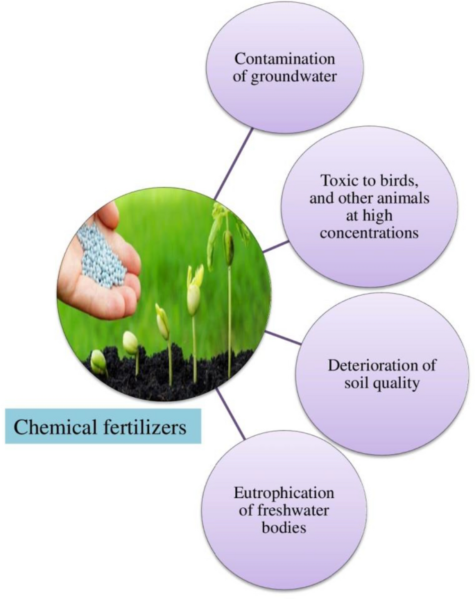Chemical fertilizers play an important role in modern agriculture, influencing plant growth and crop yield. These fertilizers have the purpose of providing essential nutrients to plants while compensating for deficiencies in soil composition. However, their widespread use has raised concerns about the effects on plant health, soil fertility, and environmental sustainability. This essay investigates the effects of chemical fertilizers on plant growth, highlighting both their advantages and disadvantages.
Understanding chemical fertilizers
- Chemical fertilizers are synthetic compounds that contain essential nutrients for plant growth, such as nitrogen (N), phosphorus (P), and potassium (K).
- These nutrients are essential for plant growth and development, influencing processes such as photosynthesis, root formation, and flowering.
- They are typically manufactured using industrial processes and tailored to specific crop and soil types.
Impacts of Chemical Fertilizers on plant growth
- Chemical fertilizers enhance plant growth and development by making nutrients easily available.
- Nitrogen fertilizers improve plant growth and vigor, especially for leafy greens.
- Nitrogen, for example, is required for the formation of proteins, enzymes, and chlorophyll, which are essential components of plant cells.
- Phosphorus promotes root development and flowering, while potassium improves disease resistance and plant health and helps plants to withstand environmental stresses.
Phosphorus cycle: Introduction, Steps, Importance, Human Impacts (thesciencenotes.com)
- When used correctly, chemical fertilizers can promote plant growth and crop quality. However, excessive or improper use can have a negative impact on plants and ecosystems.
Negative effect of chemical fertilizer on plants
- Nutrient Imbalance: Excessive use of chemical fertilizers can disrupt the nutrient balance in the soil, resulting in deficiencies or toxicities in plants. For example, unnecessary nitrogen application can promote rapid vegetative growth while inhibiting flowering and fruiting, reducing crop yield and quality.

- Soil Degradation
- Prolonged use of chemical fertilizers can cause soil degradation and nutrient depletion.
- Overreliance on specific nutrients can cause soil pH imbalances, resulting in acidification or alkalization.
- Chemical fertilizer can disrupt soil microbial communities, resulting in reduced fertility over time.
- Reduced Nutrient Absorption: Plants grown in soils with high levels of chemical fertilizers may become dependent on external inputs, resulting in reduced nutrient absorption capacity. This dependence can reduce plants’ natural resilience, making them more vulnerable to pests, diseases, and environmental stressors.
- Environmental Pollution: Runoff from chemically fertilized fields can contaminate water bodies, causing eutrophication and harmful algal blooms. Nitrogen and phosphorus runoff can also lead to groundwater pollution, endangering human health and aquatic ecosystems.
- Plant Physiology: Long-term exposure to high concentrations of chemical fertilizers can disrupt plant physiology and metabolism, affecting photosynthesis, respiration, and hormone regulation. These disruptions may impede plant growth and lower overall productivity.
Mitigation strategies and Sustainable alternatives
To reduce the negative effects of chemical fertilizer on plants and ecosystems, several mitigation strategies and sustainable alternatives can be implemented:
- Precision Agriculture: Techniques such as soil testing, nutrient management planning, and targeted fertilizer application can improve nutrient efficiency and reduce fertilizer waste.
- Organic and natural fertilizers: Utilizing organic and natural fertilizers such as compost, manure, and biofertilizers, can improve soil health, increase microbial diversity, and provide plants with a more balanced nutrient supply.
- Crop Rotation and Cover Cropping: Adding cover crops to cropping systems can improve soil structure, nutrient cycling, and pest management, reducing the need for chemical fertilizers and pesticides.
- Integrated Nutrient Management: Combining different nutrient sources, such as chemical fertilizers, organic amendments, and microbial inoculants, can result in a more sustainable and resilient agricultural system while reducing environmental impact.
- Nutrient Recycling: Practices such as crop residue management, nutrient recovery from waste streams, and precision irrigation can improve nutrient efficiency while reducing the need for external inputs.
Regulations and policy
- Chemical fertilizers are regulated globally by governments to protect both the environment and human health.
- Nutrient management plans and best practices optimize fertilizer use while minimizing environmental impact.
- Research and development efforts aim to create environmentally friendly fertilizers, including slow-release formulations and nutrient-efficient crops.
- Chemical fertilizer has undoubtedly helped to boost agricultural productivity and food security worldwide. However, indiscriminate use endangers plant health, soil fertility, and environmental sustainability.
- By implementing integrated nutrient management practices and embracing sustainable alternatives, we can reduce the negative effects of chemical fertilizer while encouraging healthy plant growth and ecosystem resilience.
- Balancing the benefits of chemical fertilizers against their potential drawbacks is critical for long-term agricultural sustainability and protecting our planet’s health.
Learn more about the
Phosphorus cycle: Introduction, Steps, Importance, Human Impacts (thesciencenotes.com)
Nitrogen cycle: Introduction, Steps, and Importance (thesciencenotes.com)